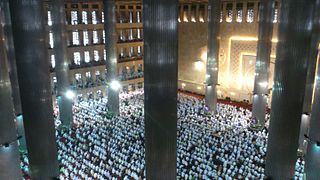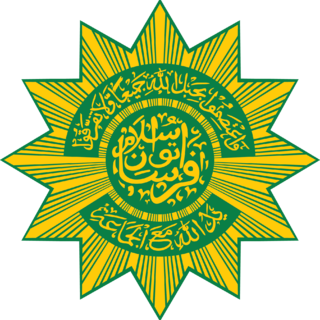
Jemaah Islamiyah is a Southeast Asian Islamist militant group based in Indonesia, which is dedicated to the establishment of an Islamic state in Southeast Asia. On 25 October 2002, immediately following the JI-perpetrated 2002 Bali bombings, JI was added to the UN Security Council Resolution 1267.

Muhammad Baqir al-Sadr, also known as al-Shahīd al-Khāmis, was an Iraqi philosopher, and the ideological founder of the Islamic Dawa Party, born in al-Kadhimiya, Iraq. He was father-in-law to Muqtada al-Sadr, a cousin of Muhammad Sadeq al-Sadr and Imam Musa as-Sadr. His father Haydar al-Sadr was a well-respected high-ranking Shi'a cleric. His lineage can be traced back to Muhammad through the seventh Shia Imam Musa al-Kazim. Muhammad Baqir al-Sadr was executed in 1980 by the regime of Saddam Hussein along with his sister, Amina Sadr bint al-Huda.

Nahdlatul Ulama is an Islamic organization in Indonesia. Its membership numbered over 95 million in 2021, making it the largest Islamic organization in the world. NU is also a charitable body funding schools and hospitals as well as organizing communities to help alleviate poverty.

Islam is the largest religion in Indonesia, with 87% of the Indonesian population identifying themselves as Muslims, based on civil registry data in 2022. In terms of denomination, the overwhelming majority are Sunni Muslims; the Pew Research Center estimates them as comprising ~99% of the country's Muslim population in 2011, with the remaining 1% being Shia who are concentrated around Jakarta and about 400,000 Ahmadi Muslims as well.
Hidayatullah is an Islamic mass organization based in Indonesia, founded in 1973. It is aimed at propagation of puritanical interpretation of Islam, and dawah (proselytization). The organization operates pesantren, mass media, women's division, and coop.
Daʿwah is the act of inviting people to Islam. The plural is daʿwāt (دَعْوات) or daʿawāt (دَعَوات).

Yusril Ihza Mahendra is an Indonesian lawyer, politician and academic, who is currently serving as the leader of the Crescent Star Party (PBB) since 2015. Previously, he served as the leader of the PBB from 1998 until 2005, Minister of Justice and Human Rights from 2004 until 2007, and member of the People's Representative Council from 1999 until 2009.

State Islamic University Syarif Hidayatullah Jakarta is a public university in Indonesia, located in Ciputat, South Tangerang, Banten.
Indonesia Institute of Islamic Dawah, is an independent social organization for study and research on Alqur'an and Alhadist. Dakwah is Arabic for religious proselytizing.

Mohammad Natsir was an Islamic scholar and politician. He was Indonesia's fifth prime minister.
Rabīʿ bin Hādī ʿUmayr al Madkhalī is a Saudi professor who is a former head of the Sunnah Studies Department at the Islamic University of Madinah. He is a Salafi Muslim scholar who is considered to be one of Salafism's prominent thinkers.

Persatuan Islam is an Islamic organization in Indonesia founded on 12 September 1923 in Bandung by a group of Muslims who are interested in education and religious activities led by Haji Zamzam and Haji Muhammad Yunus.
LIPIA is a Saudi educational institution established in Jakarta, Indonesia. The college is a branch of the Imam Muhammad ibn Saud Islamic University in Riyadh, Saudi Arabia. The main purpose is to teach Arabic and Islam. The college has been accused of promoting a fundamentalist view of Islam, harbouring political Islamists and Salafists.
Following the embargo by Arab oil exporters during the Israeli-Arab October 1973 War and the vast increase in petroleum export revenue that followed, the international propagation of Salafism and Wahhabism within Sunni Islam favored by the conservative oil-exporting Kingdom of Saudi Arabia and other Gulf monarchies achieved a "preeminent position of strength in the global expression of Islam." The Saudi interpretation of Islam not only includes Salafiyya but also Islamist/revivalist Islam, and a "hybrid" of the two interpretations.

Islam Nusantara or Indonesian (Islamic) model is a term used to refer to the empirical form of Islam that was developed in the Nusantara. This term was introduced and promoted by the Indonesian Islamic organization Nahdlatul Ulama (NU) in 2015, as an alternative for the interpretation and representation of global Islam that is currently dominated by Arabization—i.e. Saudi Wahhabism.
Campus Dakwah Institute is a collective term for a student organization in Indonesia aimed as a union for Muslim campus students as well as medium for proselytization of Islam (dawah). Most universities in Indonesia have their own LDK. In each campus, LDK can be different in its organization, in which different names are often employed, including Unit Kegiatan Mahasiswa Islam, Kerohanian Islam, Forum Studi Islam, and Badan Kerohanian Islam.
Jemaah Tarbiyah, also known as the Tarbiyah movement or the Dakwah movement, is an Islamic religious movement based in Indonesia. Jemaah Tarbiyah was an active movement during the 1980s to 1990s and consisted of university students, aimed at the religious education and da'wah (proselytizing). The movement is considered to be influenced by the teaching of Muslim Brotherhood. It is considered an important influence for Islamization of Indonesia. The movement became the bedrock of the Islamist party Prosperous Justice Party (PKS) which was founded in 2002.
In the context of Muslim society in Indonesia, Modernism or modernist Islam refers to a religious movement which puts emphasis on teachings purely derived from the Islamic religious scriptures, the Qur'an and Hadith. Modernism is often contrasted with traditionalism, which upholds ulama-based and syncretic vernacular traditions. Modernism is inspired by reformism during the late-19th to early 20th century based in the Middle East, such as the Islamic modernist, Salafiyya and Wahhabi movements. Throughout the history of contemporary Muslim Indonesia, these movements have inspired various religious organizations; from the mass organization Muhammadiyah (1912), political party Masyumi Party (1943), to missionary organization Indonesian Islamic Dawah Council (1967).

Wahdah Islamiyah is a Salafi Islamic mass organization (ormas) based in Makassar, South Sulawesi, Indonesia. The organization emerged in the late-1980s and today it owns approximately 120 branches across the archipelago. Wahdah maintains an extensive cadre training system and runs more than 200 schools, including its own higher educational institutions. The organization has a long history of cooperating with the local government through the provision of social welfare and religious education.

The Indonesian People's Da'wah Party is an Indonesian Islamist political party, founded by Farid Okbah and other Indonesian Islamists on May 31, 2021. The party was later accused of being affiliated with Jemaah Islamiyah and became the centre of a crackdown on November 16, 2021. The accusation shocked many Indonesians due to the fact it was potentially the first time in Indonesian history that a potential terrorist organisation disguised operations as a political party and attempted to intervene and participate in the Indonesian political system.










